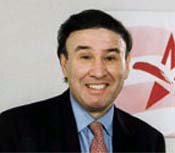 of New Election Standards Hearings State's Election 2000 Ballot Recount by the Media Kept Secret PFAWF Blasts Manipulative Officials for 'Disgraceful Silence' |
|
Compiled By GayToday
Furthermore, hearings on Florida's new election standards have produced what People for the American Way Foundation (PFAWF) calls "a disgraceful silence." PFAWF also charges that Florida's citizenry did not receive ample notice of the hearings and has blasted state officials for their "business as usual approach." The director of Florida's Division of Elections has feigned surprise that proposed new standards for counting ballots in the Sunshine State "are turning out to be a lot less controversial than we thought they would be." Only four people showed up at the first of six hearings in Miami on October 29. The public's seeming disinterest was due to the fact that voters received little or no information about these public hearings. PFAWF expressed its outrage over the Division of Elections' failure to notify the public of the hearings in a timely fashion. PFAWF urged the state Board of Elections to better publicize the remaining hearings and to consider holding additional hearings to ensure that Floridians have ample opportunity to hear about and respond to the proposed new standards. The proposed changes are designed to help clarify how election officials should interpret voters' intent, an issue that was at the center of the Florida presidential vote controversy last fall. PFAWF has more than 34,000 members and activists in Florida.
Florida State Senator Kendrick Meek has confirmed that he was not informed in advance of the October 29 hearing in Miami, which drew only four people, despite the fact that the hearing was being held in Meek's hometown. After learning of the hearing October 30 from a small newspaper article in the Miami Herald, PFAWF officials in Florida spoke with a Division of Elections employee, who stated that officials announced the hearings in an "administrative procedure document," but did not contact the news media. The Friday before these hearings began, a representative of Arrive With Five-a nonpartisan voter participation project of PFAWF-visited the division's headquarters. There was no notice of the hearings posted within the area that is accessible to the public. Even as late as November 2, the home page of the Division of Election's Web site (http://election.dos.state.fl.us/) made absolutely no mention of upcoming hearings.
"Holding public hearings without providing adequate notice to the public makes no sense at all," said Meek. "Haven't Katherine Harris and other state officials learned anything from the disgraceful events of last November?" Candidate Bob Kunst, however, has planned to be one of the few attendees at the remaining hearings. "I'll be at the November 7th hearing especially," he said, "because that date marks a year's passing since W and his brother-governor stole the presidential election in Florida. I intend to use the hearing to make this point." In January 2001, PFAWF joined other organizations in suing the Florida Secretary of State, the state's Division of Elections director and other defendants on behalf of the Florida NAACP and individual African-American and Haitian-American voters. The class-action lawsuit challenges election practices and policies that disenfranchised thousands of Floridians during the November 2000 elections. Among other remedies, this lawsuit (NAACP v. Katherine Harris) seeks the adoption of uniform and non-discriminatory voting policies in Florida by the November 2002 elections. The case was filed in federal court in the Southern District of Florida and was assigned to Judge Alan S. Gold. In August, the court denied motions to delay or dismiss part of the case. |



